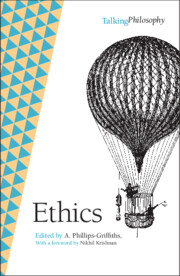Book contents
- Ethics
- Talking Philosophy
- Ethics
- Copyright page
- Contents
- Foreword
- Preface
- List of Contributors
- Objective Prescriptions
- Integrity and Self-Identity
- The Better Part
- Invincible Knowledge
- Emmanuel Levinas: Responsibility and Election
- Ethical Absolutism and Education
- Morals and Politics
- Duties and Virtues
- The Definition of Morality
- Ethics, Fantasy and Self-transformation
- How We Do Ethics Now
- Justice without Constitutive Luck
- Who Needs Ethical Knowledge?
- Institutional Ethics
- References
- Index
The Definition of Morality
Published online by Cambridge University Press: 14 January 2023
- Ethics
- Talking Philosophy
- Ethics
- Copyright page
- Contents
- Foreword
- Preface
- List of Contributors
- Objective Prescriptions
- Integrity and Self-Identity
- The Better Part
- Invincible Knowledge
- Emmanuel Levinas: Responsibility and Election
- Ethical Absolutism and Education
- Morals and Politics
- Duties and Virtues
- The Definition of Morality
- Ethics, Fantasy and Self-transformation
- How We Do Ethics Now
- Justice without Constitutive Luck
- Who Needs Ethical Knowledge?
- Institutional Ethics
- References
- Index
Summary
We use such terms as good, bad, right, wrong, should, ought, in many ways other than moral: good evidence and bad argument, right answers and wrong notes, novels which should be read and policies which ought not to be adopted. The moral is a sphere of the practical and the practical itself only a sphere or the normative. Norms guide us in all we believe, feel and do. Do these normative words then have a specifically moral sense? If so can it be defined?
- Type
- Chapter
- Information
- Ethics , pp. 190 - 227Publisher: Cambridge University PressPrint publication year: 2022

